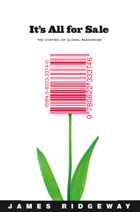2 books about Ridgeway, James

Burn This House
The Making and Unmaking of Yugoslavia
Jasminka Udovicki and James Ridgeway, eds.
Duke University Press, 2000
With Muslim, Croatian, and Serbian journalists and historians as contributors, Burn This House portrays the chain of events that led to the recent wars in the heart of Europe. Comprised of critical, nonnationalist voices from the former Yugoslavia, this volume elucidates the Balkan tragedy while directing attention toward the antiwar movement and the work of the independent media that have largely been ignored by the U.S. press. Updated since its first publication in 1997, this expanded edition, more relevant than ever, includes material on new developments in Kosovo.
The contributors show that, contrary to descriptions by the Western media, the roots of the warring lie not in ancient Balkan hatreds but rather in a specific set of sociopolitical circumstances that occurred after the death of Tito and culminated at the end of the Cold War. In bringing together these essays, Serbian-born sociologist Jasminka Udovicki and Village Voice Washington correspondent James Ridgeway provide essential historical background for understanding the turmoil in Croatia, Bosnia, and Kosovo and expose the catalytic role played by the propaganda of a powerful few on all sides of what eventually became labeled an ethnic dispute.
Burn This House offers a poignant, informative, and fully up-to-date explication of the continuing Balkan tragedy.
The contributors show that, contrary to descriptions by the Western media, the roots of the warring lie not in ancient Balkan hatreds but rather in a specific set of sociopolitical circumstances that occurred after the death of Tito and culminated at the end of the Cold War. In bringing together these essays, Serbian-born sociologist Jasminka Udovicki and Village Voice Washington correspondent James Ridgeway provide essential historical background for understanding the turmoil in Croatia, Bosnia, and Kosovo and expose the catalytic role played by the propaganda of a powerful few on all sides of what eventually became labeled an ethnic dispute.
Burn This House offers a poignant, informative, and fully up-to-date explication of the continuing Balkan tragedy.
Contributors. Sven Balas, Milan Milosevi´c Branka Prpa-Jovanovi´c, James Ridgeway, Stipe Sikavica, Ejub Stitkovac, Mirko Tepavac, Ivan Torov, Jasminka Udovicki, Susan Woodward
[more]

It's All for Sale
The Control of Global Resources
James Ridgeway
Duke University Press, 2004
Five companies dominate the U.S. petroleum industry. Five control the worldwide trade in grain. Two have a corner on the private market for drinking water. In terms of actual dollars, trade in heroin, cocaine, and tobacco ranks alongside that in grain or metals. There are more slaves in the world today than ever before. Resource by resource, It’s All for Sale uncovers and discloses who owns, buys, and sells what. Some resources—such as fuel, metals, fertilizers, drugs, fibers, food, forests, and flowers—have, for better or worse, long been thought of as commodities. Others—including fresh water, human beings, the sky, the oceans, and life itself (in the form of genetic codes)—are more startling to think of as products with price tags, but, as James Ridgeway shows, they are treated as such on a massive scale in lucrative markets around the world.
Revealing the surprisingly small number of companies that control many of the basic commodities we use in everyday life, It’s All for Sale confirms in specific detail that globalization has been accompanied by an extraordinary concentration of ownership. At the same time, it is about much more than what company has cornered the market in corn or diamonds. Corporations and captains of industry, wars and swindles, oppressors and the oppressed, empires and colonies, military might and commercial power, economic boom and bust—all these come alive in Ridgeway’s canny and arresting reporting about the global scramble for power and profit. It’s All for Sale is an invaluable source for researchers, activists, and all those concerned with globalization, corporate power, and the exploitation of individuals and the environment.
Revealing the surprisingly small number of companies that control many of the basic commodities we use in everyday life, It’s All for Sale confirms in specific detail that globalization has been accompanied by an extraordinary concentration of ownership. At the same time, it is about much more than what company has cornered the market in corn or diamonds. Corporations and captains of industry, wars and swindles, oppressors and the oppressed, empires and colonies, military might and commercial power, economic boom and bust—all these come alive in Ridgeway’s canny and arresting reporting about the global scramble for power and profit. It’s All for Sale is an invaluable source for researchers, activists, and all those concerned with globalization, corporate power, and the exploitation of individuals and the environment.
[more]
READERS
Browse our collection.
PUBLISHERS
See BiblioVault's publisher services.
STUDENT SERVICES
Files for college accessibility offices.
UChicago Accessibility Resources
home | accessibility | search | about | contact us
BiblioVault ® 2001 - 2024
The University of Chicago Press









